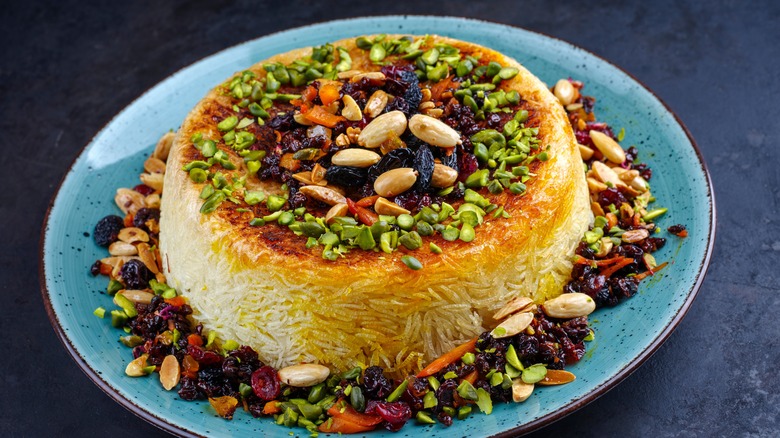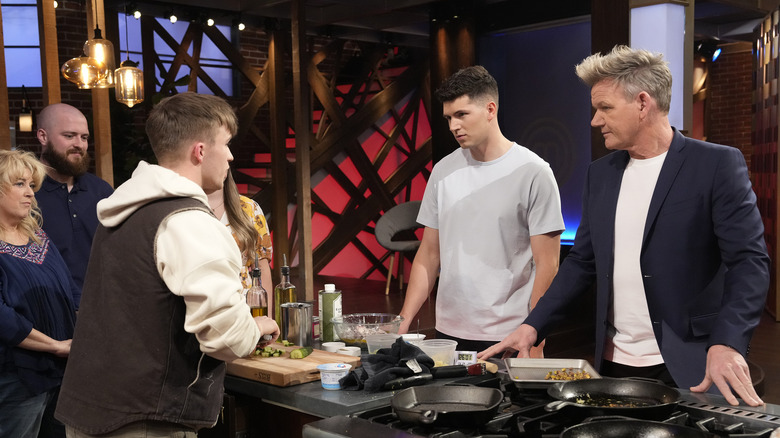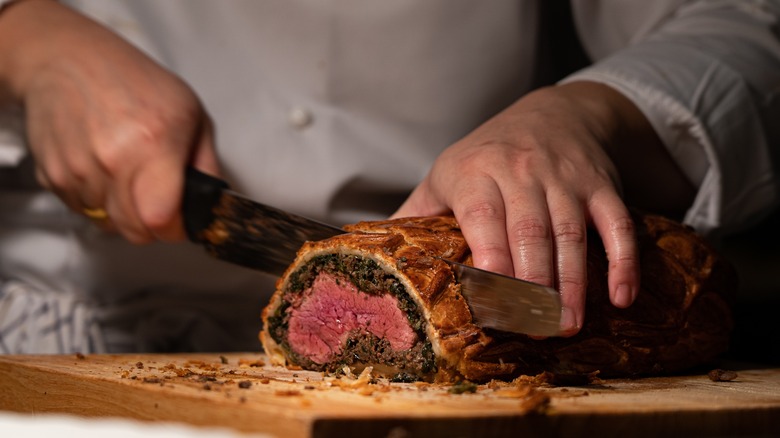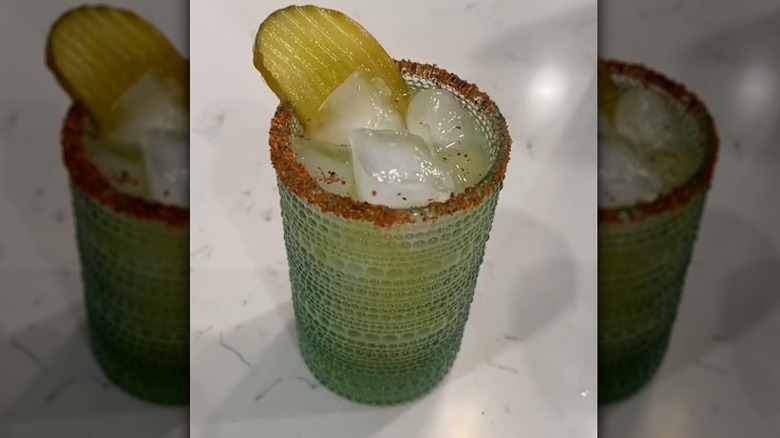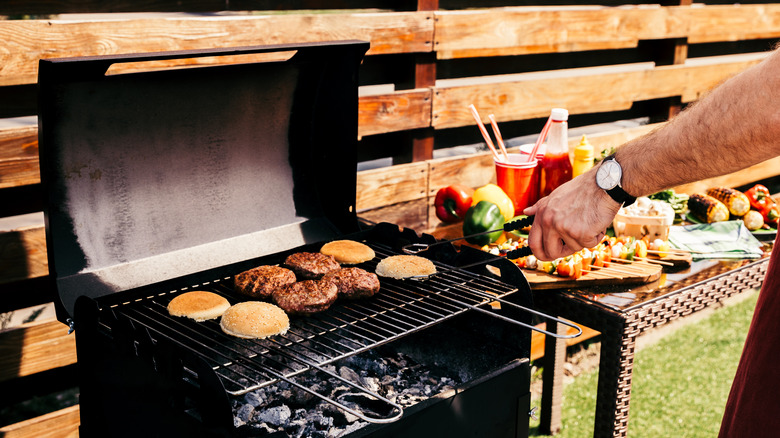MasterChef Judge Nick DiGiovanni Says Gen Z Lacks One Thing In The Kitchen - Exclusive Interview
The battle of the eras is underway with "MasterChef: Generations." This new season of the competition cooking show pits four generations against each other, the youngest of which is Gen Z. Who better to judge these up-and-coming chefs than fellow peer Nick DiGiovanni. Born in 1996, DiGiovanni lives on the very cusp of Gen Z. Despite being the youngest guest judge, DiGiovanni' background is extensive. He's started companies Osmo salt and happy potato, the latter of which fights food insecurity, worked in Michelin-starred restaurants and competed in his own season of "MasterChef." He placed third in that competition and since then proven to be a force in the food world.
Now, he's returned to "MasterChef" during the audition round, helping to find the best of the best. We got the chance to speak with DiGiovanni in an exclusive interview. We talked about his appearance on this season of "MasterChef: Generations," and what his young and resourceful generation has to offer. Although he says his generation likes to do things quick, he's not sure that it's such a bad thing.
The snack that deserves a comeback
This season of Master Chef features contestants from four generations. What are some of the foods that define your childhood?
That's a great question. So the first thing that comes to mind is crispy rice. It's a very Persian thing, and it's so simple, but it takes this sort of basic dish that everyone loves, white rice, and it makes it one of the most delicious things I think you can possibly make in the kitchen. My grandfather would always make that. And it was one of the most exciting foods I ever had growing up, even though it's just so simple.
Outside of that, I think being in New England, there was a lot of fresh seafood and learning to find and catch some of those seafoods, whether it was fish or digging for clams in the mud. Things like that are very fond memories for me.
So, how do you make crispy rice?
Being the millennial, Gen Z-er that I am, I found a quicker way to do it now, which I just throw it in my air fryer with nothing else. It's just the rice. And I just roast it at 415 or 425 degrees Fahrenheit until it's golden and brown and crispy, and then I'll put that in other dishes or I'll mix it in with something else, or I'll just eat it as a snack with a little bit of olive oil, salt and pepper. It's really, really good that way.
But the more traditional Persian way to make it is you cook it in a pot very slowly. It takes around an hour, and then it films this sort of crust across the bottom of the pot. You flip it over onto a plate and you have this sort of steamed, fluffy white rice that's coated with this crispy top, and it's really, really phenomenal.
That sounds delicious. Are there any snack foods that you loved that are no longer made, which you think deserve a comeback?
Snack foods. Well, the only one I can think of are these gummies called Shark Bites that I have continually looked for on eBay ever since they were discontinued long ago. My brothers and I never got to eat too much candy as kids. That was one of these things that if we all had to come together and fight my mom in the grocery store to get us one thing, it was fruit snacks. I don't they make them anymore. I think it was a Betty Crocker fruit snack or something. I search for them all the time still to see if someone's listed some old bag or whatever, because they're so nostalgic for me. Outside of that, I don't know. That's a big one for me that I always remember the name of and have great memories of.
Generational cooking divides
What skills and traits do you think Gen Z brings to the kitchen?
I think one great thing is that Gen Z really wants to learn. People in that age range realize that we have all the tools that we could ever possibly need to learn a lot of information in a very short period of time. The world is at our fingertips with cell phones and with social media and everything like that. That's sort of a big thing now is, historically you might have had to go on TV to learn some new thing and tune in at this specific time or have newspaper clippings or cookbooks or things like that.
Nowadays, you can pick all of those things and so much more with the internet and with social media. Food has become so much more intertwined between different cultures in a really, really fun and exciting way because of that, as well. There's all these different people sharing recipes all the time, and it can be shared so easily and so quickly, it leads to creations of new, unique foods. There are a few things there that I think of as pros. I'm sure there are just as many cons to that, but it's exciting.
What differences do you see with how the generations approach cooking?
I think going from older generations to younger generations, the younger generations tend to seem to want things faster and easier. We have air fryers. We have things that are quicker. One minute meals, five minute meals, 20 minute meals, as opposed to being in the kitchen cooking for an hour, two hours, even longer to wait for something to be done. I don't think that the younger generations have that same patience, which is fine, but I'm sure we're missing out in some ways there.
I remember having a pot roast with my grandma when we were younger, but it took a couple hours to cook and it was very simple. She would take a cast iron pot, she would put a big roast in there, and then she'd pour a can of cream of mushroom soup over it. Put some onions and some broth and all this stuff, and just let it sit there for hours. Eventually after we were done playing outside, waiting, coming in the kitchen to check when it was done, it was finally finished. I don't think any of us ever complained about waiting, but nowadays, I feel like you don't see that so much.
Salt of the earth
Your company, Osmo Salt sells a multitude of flavored salts. What do different salts do for a recipe and how can people effectively use them?
I think salt is one of the simple ways that you can take your cooking to the next level. A lot of cooking for me is focusing on the details. Salt is one that you shouldn't overlook. Down to that tiny, tiny little grain of salt on there, if it's flavored rosemary and you're just putting it on popcorn, you could be putting it on a steak, whatever it may be. That adds just that extra tiny bit of flavor, and sometimes that can make all the difference. At the end of the day, I think it's all about detail. Salt is one of those things that you can't forget about. If you cook this whole incredible meal and then you use a really low quality salt to finish it off, it doesn't make a whole lot of sense to me.
Do you have a favorite recipe that you like to use flavored salts with?
I like to get creative all the time, and I don't use too many recipes. Because of that, it's always different. Just the other day I put a creamy chicken salt on my eggs for breakfast. Things like that, where it just comes out of nowhere, but it tastes delicious, and I've tried something new and I love it. I might do it again, or I might try something totally different tomorrow.
Your brand happy potato focuses on food waste. What are some of your favorite ways to use up vegetables and fruit scraps?
What I've always done is [use] vegetable scraps, and especially meat trimmings and bones and Parmesan rinds. I freeze all those and I'll make ... I just end up calling it a chicken stock, even if there's more steak or meat bones in there than there are actual chicken carcasses and chicken bones.
I find that if you just save up all those scraps over even a month or two months or three months and then get a rotisserie chicken, which is one of my favorites as well, eat that chicken. The carcass that you're left with can be a foundation to use all of those scraps that you've saved up for a while. It makes for just the best broth. Also a different broth every time, which is kind of fun.
Gordon Ramsay is the king of Beef Wellington
Last year you and Gordon Ramsay beat the world record for the largest beef Wellington. So how did you scale that recipe and ensure the meat was still cooked inside?
That was kind of a tricky one. We held all the meat together using this thing called meat glue. It sounds kind of nasty, although they use it in restaurants — a lot more than you might think. We had thermometers in there when we were cooking it and tried to make sure that the thing didn't overcook when it was in the oven, because there were so many filets glued together.
It really would have been impossible to use your gut instinct or do anything else. That one we had to be a little bit more scientific with and just use a bunch of thermometers and temperature gauges, keep a close eye on how that was cooking, but it was a very difficult project.
Do you have any tips or tricks for making a beef Wellington?
Well, my initial answer to that would be that I always defer to Gordon, who's definitely the expert on that one. But, it's key that you just ... I have a trick that I like to use where I do crepes around everything before you wrap the puff pastry around the whole Wellington.
Otherwise, I feel like if you bake it, and have that beautiful puff pastry suddenly become soggy because your whole Wellington, the meat juices and everything are leaking out, it ruins all of that hard work. We all know how long a beef Wellington takes to make. That's my one tip and suggestion, to really make sure you wrap that Wellington well before you put on the puff pastry. After all that work, you don't want to make it go to waste.
Gordon Ramsay also wrote the forward for your book. How has your relationship evolved since you first appeared on Master Chef?
Gordon Ramsay has been a really great mentor to me. He and I have kept in touch over time. I think we've had almost a funny kind of back and forth on the internet for quite some time, with different videos and me recreating some recipe that he made, or maybe poking fun at him even. Always in a playful way. That's why it was really fun to circle back after all that time and then judge with him for the newest season of "MasterChef."
This margarita is ... alright, alright, alright
Earlier this year you and Matthew McConaughey made a pickle margarita. So why does that unusual combination of flavors work?
So, when I think about food, I always think about balance no matter what the dish is. The reason I think a pickle margarita actually, in a funny, crazy way works, is because you have that acidity from the pickle juice that, in its own unique way, is actually quite delicious by itself — even to a lot of people. Immediately it gives that drink balance. You can think of the pickle juice instead of using lemon or lime juice. It's just a different type of acidity.
How do you make a pickle margarita?
I would say first of all, if you're going to go out and make a pickle margarita, you can get creative with it yourself and use whatever ingredients you really want to. The way we did it was buy a jar of pickles that are your favorite pickles. That's a good way to start. Then, pour out most of the juice. You can save it for something else like brining your chicken before you make some sort of chicken dish, or fried chicken.
All you really do is add jalapeños, maybe a little bit of agave or honey. Obviously, your alcohol of choice and maybe a squeeze of lime, and really whatever else you like in there, and shake it up. You're sort of topping off a jar of pickles with a bit of juice at the bottom and whatever kind of classic cocktail ingredients that you'd like. You'd be surprised how well it works and how good it tastes.
I was looking at it and I was like, "Oh, that looks really good." Because as you mentioned that salty kind of works with it.
Yeah. In a really strange way. It actually works.
What have been some of your favorite food trends of 2024?
Food trends. I feel like there's always a new food trend every time you look. Let me think about that. My honest answer to you is that I [don't] use the internet enough to be super in touch with food trends, and I feel like I hear about them [late]. My friends, I'll call them my creator friends and my friends who have a life on the internet, they all make fun of me for always being six months late to every single trend. That should tell you where I'm at with those! I won't know the trends until probably four to six months from now, because I'm not on all the social media apps enough myself, as crazy as it sounds.
Well, we'll be sure to circle back with you in four to six months.
Yeah, exactly.
Grilling up some killer burgers
With summer approaching, what are some of your top grilling tips?
Grilling tips. My number one tip for grilling is that oftentimes people get too excited and they throw their food onto the grill too quickly before it's reached the proper temperature. My number one tip would be to be patient and wait till your grill really, really, really is at that hottest point you can get it for that initial crust and sear that you want to get on whatever you might be grilling, whether it's vegetables, steak, chicken, fish, anything else. And patience is really, really key there. I think that's an easy, simple mistake that a lot of people make, but it's also a very simple thing to fix.
What are some of your favorite ways to upgrade a burger?
Upgrade a burger. That's a good question, too.
Well, one of the big things that even I forget about sometimes is using seasonal ingredients, because it can be easy to [forget]. Going to the market, where they have every single ingredient, oftentimes year round, because they're getting them from different places. It makes you forget the fact that things are still ultimately seasonal.
If you can go and find some farmer's market and find the latest, actually seasonal things that are growing in the area near you, even something as simple as a really, really good heirloom tomato, those are great things to be able to elevate. Not just a burger, but anything. That's one sort of theory I have, because the markets have everything year round now, it's really easy to forget that things are seasonal and they taste so much better when you can get them seasonally. It's a good thing to step back and remember.
Nick DiGiovanni's fellow Gen Z's go head-to-head on "MasterChef: Generations," now streaming on Hulu.

